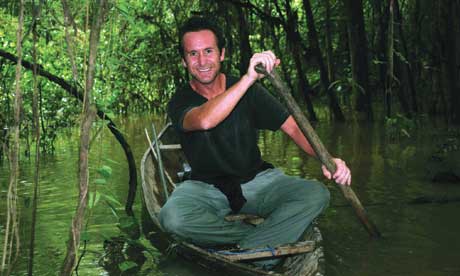
Bruce Parry talks about exploring the spectacular, controversial and endlessly varied Amazon
So, why the Amazon?
Bruce Parry: It was the BBC’s suggestion and we jumped at it. With my history of working with tribal peoples, and my production team’s interest in social and environmental issues, it seemed like a natural progression. If you’re going to look at these issues, well, there’s no better place than the Amazon. And it was something different for me too: I’m more of a presenter than in Tribe.
And you followed it from source to mouth…
Bruce Parry: Yes, but not the whole river. It wasn’t a river expedition. It was a spiritual cord I was following, where I was dancing off left, right and centre to different places.
So you travelled through a range of landscapes…
Bruce Parry: I started in the high Andes in Peru where the Amazon is just a trickle of glacial melt and the landscape incredibly barren with not a tree for miles. We do travel through all the different ecosystems but it’s soon evident that this is not a geographical journey. This is about the people of the Amazon.
How did it differ from previous expeditions?
Bruce Parry: Before, my expeditions have been rather self-indulgent, like me climbing a mountain in New Guinea or joining a tribe. In this case, I’m being paid to go and tell stories; it is not an ego trip. And it was meticulously planned. There’s an amazing team who were zooming about at least six months before we departed, finding contacts and contributors.
But it’s hard because there are so many stories to tell. All we could do was go out to visit the best example of a situation we could find nearest to us at that moment. Hopefully that little bit will be indicative of what’s happening not only in the Amazon but also in the world.
How did you handle it? You tackle some serious issues.
Bruce Parry:I still wonder whether I was the right choice! My mental capacity to deal with these enormous issues has been tested to the max. I am not a political or economic analyst, so when I went into the coca fields, I could only talk about the things I saw in front of me. I’ll go and live with a coca farmer and see that he’s not a drug baron but just a farmer trying to feed his kids. I can listen to people and highlight some of the futility of what is going on, but I can’t extrapolate and start talking about the American social global war on drugs. That would be me bringing in a judgment and that’s not what we do.
These subjects are so big; they affect all of us. That quickly becomes the theme of the expedition. It’s easy to sit on our hardwood garden chairs and talk about ‘those bloody loggers in Brazil’, but when you go and meet those loggers, they’re just wonderful. We can’t sit there comfortably and point fingers.
It’s about the consumer and ignorance. The Amazon could disappear, and if it does, then it will affect us and that’s why for the first time in years we are actually bothering to look into these issues.
Did you miss the immersive experience you had in Tribe?
Bruce Parry: Professionally I missed it. There’s no doubt that being with a community for a longer period gives you a deeper insight. But, personally, I gained – it’s bloody hard work living in a mud hut for a month. Ultimately we realised that we can’t replicate Tribe with every community. We’re on a journey and have lots of stories to tell, so we just have to let go of that deeper, personal stuff.
Which places had the most impact on you?
Bruce Parry: The first voices and the last voices of the Amazon were the most powerful. The first were this incredible family of alpaca herders in the High Andes who were so welcoming. I’d only been with them for a few days, but when I left they gave me their treasured wedding poncho. It’s so hard to get your head round such extraordinary generosity.
The last group I met were the Kayapo tribe in Para State – a desolate place with so much corruption. At one stage the Kayapo were caught up in hiring people to chainsaw the forest and set up goldmines. But then they realised that their old ways were better. So they had a foot in both worlds and have chosen their traditional ways.
Did you get a good reaction from the locals?
Bruce Parry: We generally highlighted communities that represented something going on. I would go to them and ask them to tell us about it, and of course they were always receptive to that. For example, I went to visit my old friends, the Matis, who I stayed with on Tribe. But when I greeted them, their first words were: “Bruce, we’re dying”. There was a massive epidemic and for many reasons, they just weren’t surviving. I couldn’t have stayed there and ignored the problem. They wanted to talk about the epidemic, so that is what we did.
It must have been hard for you to see old friends suffering?
Bruce Parry: Of course. The whole journey was really intense. The programme isn’t meant to be a call to arms, but I hope it’s a bit of a shake-up.
And what’s next for you?
Bruce Parry: Well, I rant on about what we should all do about this situation, so I feel I need to do something myself. I’m hoping that this CD I’m releasing will help. But also I want to be at home – I’m really exhausted. That obviously doesn’t fit in with my call to arms but at the same time I know I have to try and have a bit of life at home. We’ll see how guilty I feel about it all.